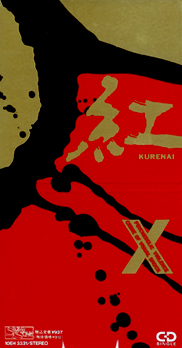Kurenai (song)
| "Kurenai" | ||||
|---|---|---|---|---|
 |
||||
| Single by X | ||||
| from the album Blue Blood | ||||
| B-side | "20th Century Boy (Live)" | |||
| Released | September 1, 1989 | |||
| Format | 8cm CD | |||
| Recorded | June 10, 1989 at Hibiya Yaon (track 2) | |||
| Length | 8:43 | |||
| Label | CBS/Sony | |||
| Songwriter(s) | Yoshiki | |||
| Producer(s) | X, Naoshi Tsuda | |||
| X singles chronology | ||||
|
||||
| Audio sample | ||||
|
|
||||
"Kurenai" (紅?, literally "crimson") is a song by Japanese heavy metal band X Japan, written by Yoshiki. One of the band's oldest songs, they have been performing "Kurenai" since 1985, several versions have been released. Most significantly, as their major label debut single on September 1, 1989.
"Kurenai" was first released on X's June 1985 live demo tapes, which were titled "Live" and "Endless Dream". The lyrics are entirely in Japanese, while the next version, released on their April 1988 debut album Vanishing Vision, is entirely in English and begins with an intro played by hide on guitar. A flexi disc included within the June 1988 issue of Rockin' f magazine, contains "Kurenai (Original Japanese Version)". It begins with an intro played by Yoshiki on piano and contrary to the title, was mostly in English. The version on 1989's Blue Blood begins with an orchestrated piece, then the guitar intro, and is mostly in Japanese, with only the opening lyrics in English. Only a few months later, the single version was released, although very similar to the recording on Blue Blood, it does not have the orchestrated intro.
While appearing to be a love song, Yoshiki stated that "Kurenai" is actually about the struggle of one's heart. hide revealed that it was his favorite X song before he joined the band and was disappointed that they did not perform it when he did, so he had to nag to get them to play it. Yoshiki commented that was probably because the song's arrangement at the time was too simple. Both Toshi and Taiji felt that the track has a very Japanese feel to it, with Taiji stressing that each member helped arrange the version that appears on their debut album.
...
Wikipedia
